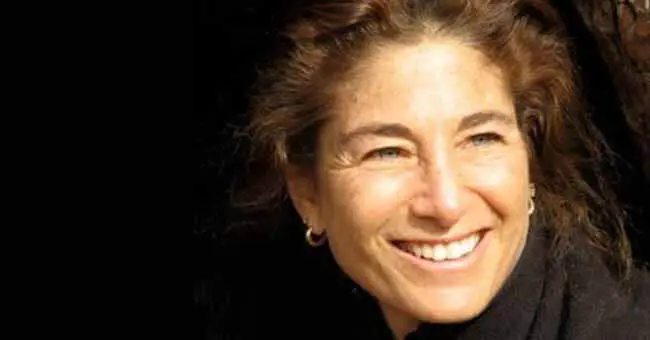Are you feeling a little stuck in life? The technique of “radical acceptance” could be the secret to help you sail through life smoothly.
According to one of the world’s meditation leaders Tara Brach, radical acceptance is not to say you approve of any abusive and harmful situations. Rather, it stops us from fighting reality, helps us to acknowledge our life situation without causing more drama and pain. Her powerful Buddhist-inspired quotes will help you confront your fears and rediscover love and compassion.
Table of Contents
Radical Acceptance (and Freedom)
1. “Nothing is wrong—whatever is happening is just ‘real life’.”
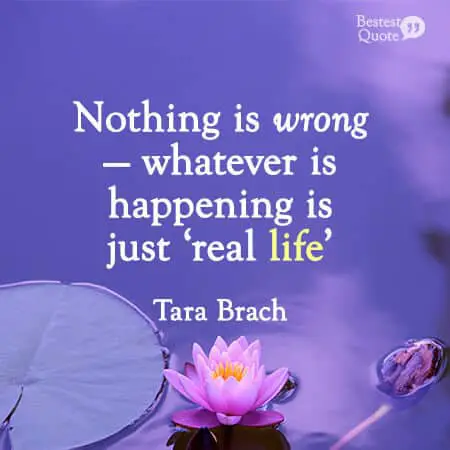
2. “Radical Acceptance is the willingness to experience ourselves and our lives as it is.”
3. “Clearly recognizing what is happening inside us, and regarding what we see with an open, kind and loving heart, is what I call Radical Acceptance. If we are holding back from any part of our experience, if our heart shuts out any part of who we are and what we feel, we are fueling the fears and feelings of separation that sustain the trance of unworthiness. Radical Acceptance directly dismantles the very foundations of this trance.”
4. “Imperfection is not our personal problem – it is a natural part of existing.”
5. “Pain is not wrong. Reacting to pain as wrong initiates the trance of unworthiness. The moment we believe something is wrong, our world shrinks and we lose ourselves in the effort to combat the pain.”
6. “The beauty we long for is already here.”
7. 'What would it be like if I could accept life--accept this moment--exactly as it is?' Tara Brach Click To Tweet
8. “The boundary to what we can accept is the boundary to our freedom.”
9. “When we put down ideas of what life should be like, we are free to wholeheartedly say yes to our life as it is.”
10. “There is something wonderfully bold and liberating about saying yes to our entire imperfect and messy life.”
11. “Learning to pause is the first step in the practice of Radical Acceptance. A pause is a suspension of activity, a time of temporary disengagement when we are no longer moving toward any goal… The pause can occur in the midst of almost any activity and can last for an instant, for hours or for seasons of our life. . . . We may pause in the midst of meditation to let go of thoughts and reawaken our attention to the breath. We may pause by stepping out of daily life to go on a retreat or to spend time in nature or to take a sabbatical. . . . You might try it now: Stop reading and sit there, doing “no thing,” and simply notice what you are experiencing.”
12. “Observing desire without acting on it enlarges our freedom to choose how we live.”
13. “Our attitude in the face of life’s challenges determines our suffering or our freedom.”
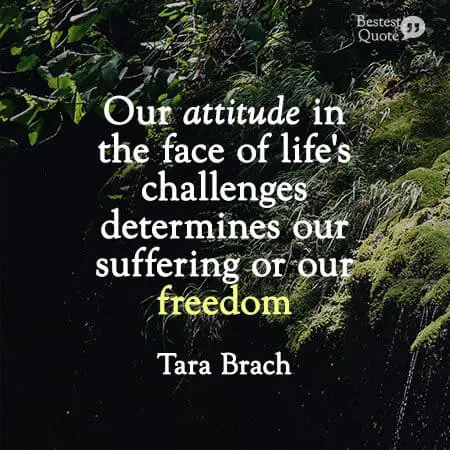
14. “The renowned seventh-century Zen master Seng-tsan taught that true freedom is being “without anxiety about imperfection.”
15. “You have a unique body and mind, with a particular history and conditioning. No one can offer you a formula for navigating all situations and all states of mind. Only by listening inwardly in a fresh and open way will you discern at any given time what most serves your healing and freedom.”
16. “The only way to live is by accepting each minute as an unrepeatable miracle.”
17. “The way out of our cage begins with accepting absolutely everything about ourselves and our lives, by embracing with wakefulness and care our moment-to-moment experience. By accepting absolutely everything, what I mean is that we are aware of what is happening within our body and mind in any given moment, without trying to control or judge or pull away. I do not mean that we are putting up with harmful behavior—our own or another’s. This is an inner process of accepting our actual, present-moment experience. It means feeling sorrow and pain without resisting. It means feeling desire or dislike for someone or something without judging ourselves for the feeling or being driven to act on it.”
18. “I decided that instead of resisting everything, I would agree to everything. I began to greet whatever arose in my awareness with a silently whispered “yes”.”
19. 'We can’t understand the nature of reality until we let go of controlling our experience.' Tara Brach Click To Tweet
20. “Suffering is our call to attention, our call to investigate the truth of our beliefs.”
21. “The way out of our cage begins with accepting absolutely everything about ourselves and our lives, by embracing with wakefulness and care our moment-to-moment experience.”
22. “Mindfulness is a pause – the space between stimulus and response: that’s where choice lies.”
23. “Stopping the endless pursuit of getting somewhere else is the perhaps most beautiful offering we can make to our spirit.”
24. “We wait for things to be different in order to feel okay with life. As long as we keep attaching our happiness to the external events of our lives, which are ever changing, we’ll always be left waiting for it.”
25. “Happiness lies not in finding what is missing, but in finding what is present.”
Love
26. “I found myself praying: “May I love and accept myself just as I am.”
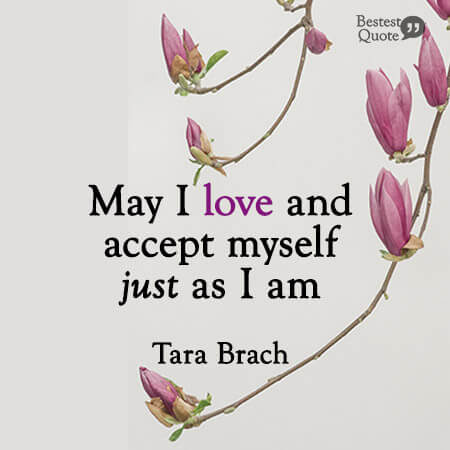
27. “On this sacred path of Radical Acceptance, rather than striving for perfection, we discover how to love ourselves into wholeness.”
28. “But this revolutionary act of treating ourselves tenderly can begin to undo the aversive messages of a lifetime.”
29. “Perhaps everything that frightens us is, in its deepest essence, something helpless that wants our love.”
30. “Whenever we reject a part of our being, we are confirming to ourselves our fundamental unworthiness.”
31. “Paying attention is the most basic and profound expression of love.”
32. 'With an undefended heart, we can fall in love with life over and over every day.' Tara Brach Click To Tweet
33. “The “one I love” was everywhere, including within me.”
34. “If our hearts are ready for anything, we can open to our inevitable losses, and to the depths of our sorrow. We can grieve our lost loves, our lost youth, our lost health, our lost capacities. This is part of our humanness, part of the expression of our love for life.”
35. “There is so much division in this world. So what is really the path of healing? It can begin in this moment, by embracing the life that’s here.”
36. “Perhaps the biggest tragedy of our lives is that freedom is possible, yet we can pass our years trapped in the same old patterns.”
37. “By honoring what has passed away, we are free to love the life that is here.”
Fear
38. “When you know you’re the ocean, you’re not afraid of the waves.”
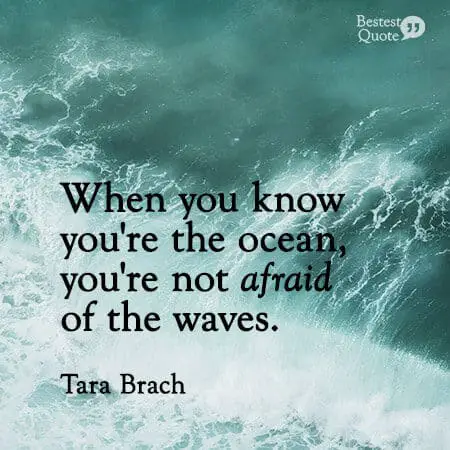
39. “Fear of being a flawed person lay at the root of my trance, and I had sacrificed many moments over the years in trying to prove my worth. Like the tiger Mohini, I inhabited a self-made prison that stopped me from living fully.”
40. “The emotion of fear often works overtime. Even when there is no immediate threat, our body may remain tight and on guard, our mind narrowed to focus on what might go wrong. When this happens, fear is no longer functioning to secure our survival. We are caught in the trance of fear and our moment-to-moment experience becomes bound in reactivity. We spend our time and energy defending our life rather than living it fully.”
41. “Fear is the anticipation of future pain.”
42. “Feelings and stories of unworthiness and shame are perhaps the most binding element in the trance of fear. When we believe something is wrong with us, we are convinced we are in danger. Our shame fuels ongoing fear, and our fear fuels more shame. The very fact that we feel fear seems to prove that we are broken or incapable. When we are trapped in trance, being fearful and bad seem to define who we are. The anxiety in our body, the stories, the ways we make excuses, withdraw or lash out—these become to us the self that is most real.”
43. “We withdraw from our experience of the present moment. We pull away from the raw feelings of fear and shame by incessantly telling ourselves stories about what is happening in our life.”
44. 'Fear is part of being alive.' Tara Brach Click To Tweet
45. “While the bodies of young children are usually relaxed and flexible, if experiences of fear are continuous over the years, chronic tightening happens. Our shoulders may become permanently knotted and raised, our head thrust forward, our back hunched, our chest sunken.”
46. “When we get lost we need only pause, look at what is true, relax our heart and arrive again.”
47. “When we relax about imperfection, we no longer lose our life moments in the pursuit of being different and in the fear of what is wrong.”
48. “We are uncomfortable because everything in our life keeps changing — our inner moods, our bodies, our work, the people we love, the world we live in. We can’t hold on to anything — a beautiful sunset, a sweet taste, an intimate moment with a lover, our very existence as the body/mind we call self — because all things come and go. Lacking any permanent satisfaction, we continuously need another injection of fuel, stimulation, reassurance from loved ones, medicine, exercise, and meditation. We are continually driven to become something more, to experience something else.”
Compassion
49. “Awakening self-compassion is often the greatest challenge people face on the spiritual path.”
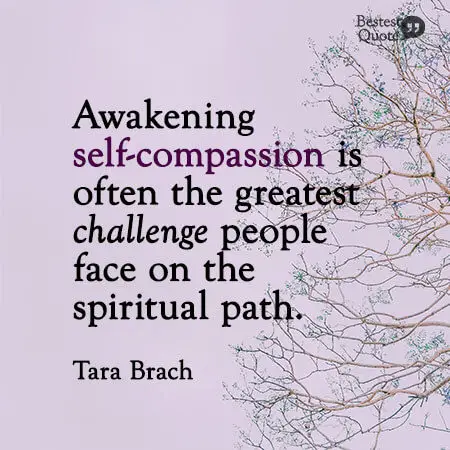
50. “Compassion can be described as letting ourselves be touched by the vulnerability and suffering that is within ourselves and all beings. The full flowering of compassion also includes action: Not only do we attune to the presence of suffering, we respond to it.”
51. “The intimacy that arises in listening and speaking truth is only possible if we can open to the vulnerability of our own hearts. Breathing in, contacting the life that is right here, is our first step. Once we have held ourselves with kindness, we can touch others in a vital and healing way.”
52. “Each time you meet an old emotional pattern with presence, your awakening to truth can deepen. There’s less identification with the self in the story and more ability to rest in the awareness that is witnessing what’s happening. You become more able to abide in compassion, to remember and trust your true home.”
53. “Spiritual awakening is the process of recognizing our essential goodness, our natural wisdom and compassion.”
54. 'Once we have held ourselves with kindness, we can touch others in a vital and healing way.' Tara Brach Click To Tweet
55. “When we stop to attend and see others as real, we uncover the hidden bond that exists between all beings.”
56. “As we bring a kind of attention to our own conscious and vulnerable being, we become more alert to how all beings are sentient, how they hurt and want to stay alive.”
57. “Feeling compassion for ourselves in no way releases us from responsibility for our actions. Rather, it releases us from the self-hatred that prevents us from responding to our life with clarity and balance.”
58. “The next time you find yourself in some way trying desperately to land safely, your compassion might be what finally gives you the courage you need to let go of the controls. In doing so, you might discover that each time you let go, it becomes easier and easier to re-enter the atmosphere of your own aliveness. Gradually you’ll come home to the flow of your own living presence, the warmth and space of your awakening heart.”
59. 'If our hearts are ready for anything, we will spontaneously reach out when others are hurting. Living in an ethical way can attune us to the pain and needs of others, but when our hearts are open and awake, we care instinctively.'… Click To Tweet
60. “Imagine you are walking in the woods and you see a small dog sitting by a tree. As you approach it, it suddenly lunges at you, teeth bared. You are frightened and angry. But then you notice that one of its legs is caught in a trap. Immediately your mood shifts from anger to concern: You see that the dog’s aggression is coming from a place of vulnerability and pain. This applies to all of us. When we behave in hurtful ways, it is because we are caught in some kind of trap. The more we look through the eyes of wisdom at ourselves and one another, the more we cultivate a compassionate heart.”
Belonging and True Refuge
61. “We yearn for an unquestioned experience of belonging, to feel at home with ourselves and others, at ease and fully accepted. But the trance of unworthiness keeps the sweetness of belonging out of reach.”
62. “True refuge is that which allows us to be at home, at peace, to discover true happiness. The only thing that can give us true refuge is the awareness and love that is intrinsic to who we are. Ultimately, its our own true nature.”
63. 'We can find true refuge within our own hearts and minds-right here, right now, in the midst of our moment-to-moment lives.' Tara Brach Click To Tweet
64. “We find true refuge whenever we recognize the silent space of awareness behind all our busy doing and striving. We find refuge whenever our hearts open with tenderness and love. We find refuge whenever we connect with the innate clarity and intelligence of our true nature.”
65. “Developing an inner refuge where we feel loved and safe enables us to reduce the intensity of traumatic fear when it arises.”
66. “The great gift of a spiritual path is coming to trust that you can find a way to true refuge. You realize that you can start right where you are, in the midst of your life, and find peace in any circumstance. Even at those moments when the ground shakes terribly beneath you—when there’s a loss that will alter your life forever—you can still trust that you will find your way home. This is possible because you’ve touched the timeless love and awareness that are intrinsic to who you are.”
67. “Longing, felt fully, carries us to belonging.”
Facts about Tara Brach
Born on 17 May 1953, in New Jersey, United States Tara Brach is a psychologist, author, and teacher of meditation. She practiced and taught yoga at an ashram for ten years. While at the ashram, Brach attended a Buddhist Insight Meditation retreat. In 1998 Tara Brach founded the largest non-residential meditation center in the United States, the Insight Meditation Community of Washington. Today, she is one of the leaders in the world of meditation promoting the techniques of meditation to workplace and prisons to help people destress. Her podcast, a guided meditation talk, receives over a million downloads in a month. Tara Brach is also the bestselling author of Radical Acceptance: Embracing Your Life with the Heart of a Buddha and True Refuge.
Further Reading:
- Feeling Overwhelmed? Remember RAIN. Four steps to stop being so hard on ourselves
- Tara Brach On How Meditation Brings Healing To Workplace Fears During Turbulent Times
See also:
- 101 Life-Changing Quotes by Eckhart Tolle to Happiness and Inner Peace
- 70+ Fear of Getting Hurt Quotes (To Help You Choose Love Over Fear)
- 60+ Eckhart Tolle Quotes on Love and Relationships (how to be with an unconscious partner)
- Top 90 J.K. Rowling Quotes about Love, Life and Success
- 80+ Byron Katie’s Quotes On Love And Marriage (How It Takes Only One To End Suffering)

